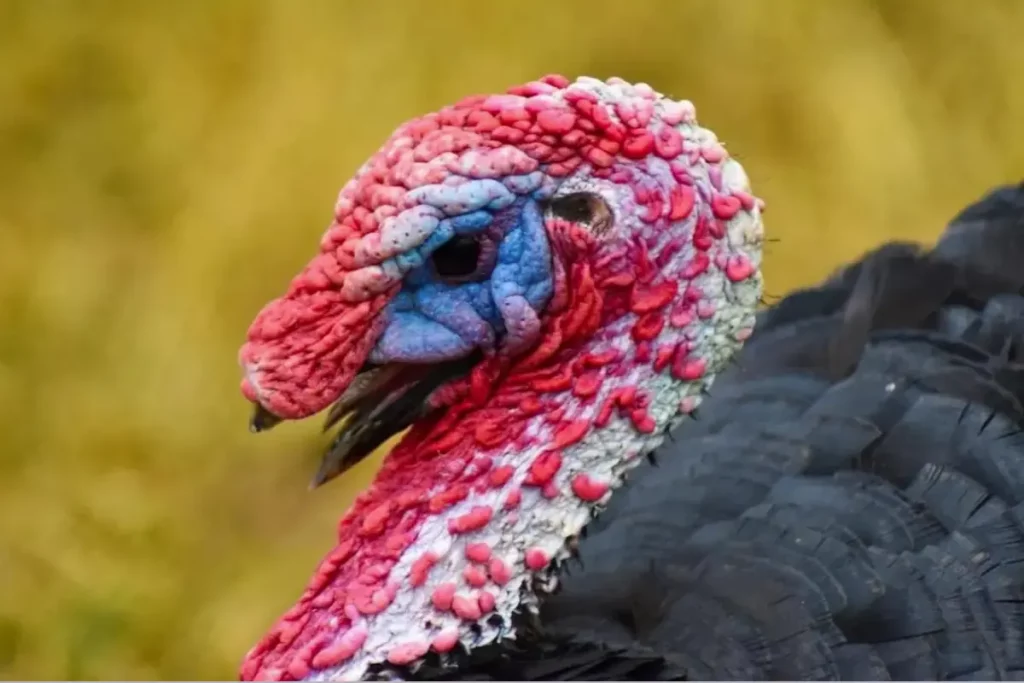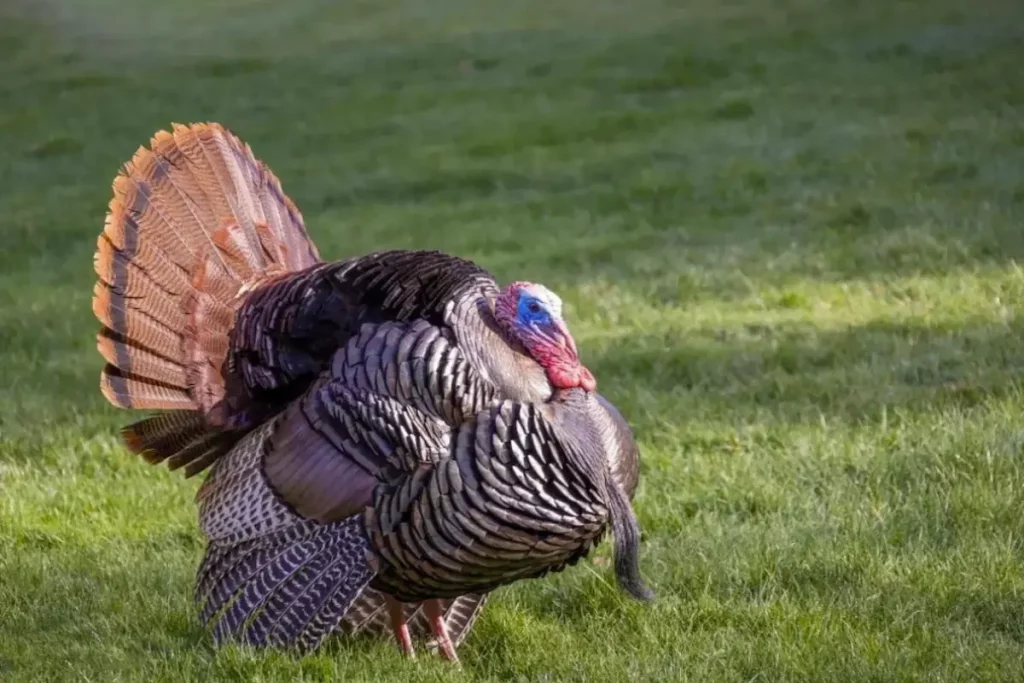Did you know that birds and Tyrannosaurus rex come from the same family tree? Harmless-looking birds like turkeys and chickens can be more aggressive than they think. But do turkeys eat snakes? We learn about the predatory behavior of turkeys, the risks of snakes, and much more.
Do turkeys eat snakes?
Turkeys can comfortably eat small snakes, and a group of turkeys can also eat larger ones. However, it can be dangerous for them if the snake is venomous. Wild turkeys are eager to hunt snakes, while domestic turkeys may not be as skilled as wild turkeys.
Turkeys are omnivores. This means eating meat, seeds, grass, and anything that looks like food. They are not picky eaters. The menu features various types of meat such as frogs, snakes, lizards, and rodents.
Now let’s talk about snakes. There are various snakes in the country, and turkeys can eat most of them without problems. As long as the snake isn’t too big, the turkeys will fight and eat it.
However, several boa constrictors can be dangerous to turkeys. Even a tiny venomous snake can be dangerous to a turkey if it has the chance to bite. But for these reptiles, it is not so easy.
Turkeys have thick skin on their legs and a compact layer of feathers on their bodies that protect them from snake bites. However, turkeys are such expert snake hunters that most snakes cannot touch them.
Turkeys usually live in groups. If someone finds a snake, all the turkeys will join the fight. The turkeys continually beat the snake until the snake dies. So if you have a few turkeys, snakes will be afraid of the place and will never sneak into their house.
If the snake is a little larger, the turkeys will still harass you and force them to leave their territory. Find out if turkeys can eat these common snakes.
Rattlesnakes:
Yes, turkeys can eat rattlesnakes. Rattlesnakes are highly venomous snakes and can cause the end of their lives. But turkeys don’t care. Eating snakes is a turkey instinct. Snakes are a good source of food and a potential threat to their eggs and young.
So you never let a snake go without a scratch.
Vipers:
Vipers are commonly found in various regions of the United States and are also highly venomous. Turkeys can eat vipers without much problem.
Other snakes:
Turkeys can eat small and medium-sized snakes. No matter if the snake is venomous or not.
Related: CAN TURKEYS EAT TOMATOES? (READ THIS FIRST!)
Do turkeys keep snakes away?
Yes, turkeys can keep snakes away. Snakes see turkeys as predators and try not to fall in front of them. However, a giant snake can eat turkeys and eggs. But no matter how gigantic the snake is, it will be afraid of a group of turkeys.
So the question is, should you rely on turkeys to prevent snakes from coming out of their house? Well, relying solely on turkeys is not a good idea. If your yard is snake-friendly, snakes may enter if you get the chance.
However, you should also save the turkeys from snakes. Pet turkeys are not such skillful hunters as wild turkeys. They get readily available foods to form you. On the other hand, wild turkeys have to fight frogs and snakes now and then.
Turkeys can indeed work as a part of the snake protection system in your house, but we recommend not to depend on them entirely.
3 reasons why turkeys will eat snakes
There are some solid reasons why turkeys eat snakes. Here we quote some.
As a food:
Small snakes are a lucky gift for you. They eat grass, seeds, insects, leaves, and fruits in the wild, but prefer meat, like most humans. Why so? Meat is the most nutrient-dense food on earth.
You get proteins, fats, and various vitamins and minerals such as iron, salts, calcium, phosphorus, vitamin B1, B2, and many others. So from a survival perspective, it is a good reason to hunt snakes for food.
To remove hazards:
Turkeys know how dangerous a snake can be, especially to newborns and eggs. They eat the snake so that it cannot harm them.
Having fun:
Like most animals, turkeys need some fun things to do. Not much exciting happens with domestic turkeys. Eating a snake with the whole family is a celebration for you. Well, for wild turkeys it’s fun, but more for survival.
Related: CAN TURKEYS EAT SUNFLOWER SEEDS? (QUICK ANSWERS)
What breed of turkeys eat snakes?
There are two species and many subspecies of turkeys. They have differences in size, weight, and feather color, but their food habits are almost the same. They eat everything they find. Check if those turkeys can eat snakes.
Brush turkeys:
Brush turkeys are native to Australia and can eat small snakes. Leaves, fruits, seeds, and insects are their main source of food, but they leave no chance of eating snakes, frogs, and small lizards.
Wild turkeys:
Wild turkeys are skilled snake hunters. They hit the snakes with their beak and watch the snake closely to avoid bites. It is an easy task for them as they often encounter snakes.
Domestic turkeys:
There are two types of domestic turkeys. People farm white turkeys for meat, and they usually stay on a closed farm. Those turkeys are not good hunters, and you will have to protect them from snakes.
Domesticated wild turkeys can safely eat small snakes, but more venomous snakes can be risky.
Baby turkeys:
After 24 hours of hatching, the turkeys begin to migrate with their mother and eat almost everything their mother eats. Baby turkeys may have a chance to eat a snake if their mother manages to catch one, and there is no competition for that.
Are turkeys immune to snake venom?
No, turkeys are not immune to snake venom. Some hunting birds can survive mild doses of snake bites, but turkeys aren’t so lucky. However, it is difficult to bite a turkey if the snake is small.
Turkeys are skilled at catching snakes. A group of turkeys strikes upon snakes from different sides, so the snake does not find a way to strike back or escape.
A bigger, faster snake might find a way to escape, and it will never return. By keeping your yard clean and unfriendly to snakes, you can reduce the chances of snakes entering the yard.
How to keep turkeys safe from snakes?
You can protect your garden and turkeys from snakes by following simple steps. Protecting your yard means creating an unfavorable environment for snakes. Some plants and ingredients can also help you get rid of snakes. Here we will discuss some effective techniques to protect turkeys and your garden from snakes.
Keep your yard clean:
Snakes need a place to hide. You usually don’t want to stay in an open position. Leaves, holes, fallen branches, and stones are your favorite places to camouflage yourself. Cleaning the yard and removing rocks and holes can prevent snakes.
Build walls:
Fences are not so effective against snakes. Walls can prevent snakes from entering your house. However, some snakes can climb walls, but they usually would not give that effort.
Get rid of rodents:
If there are rodents, your every protection can fail. Snakes are highly attracted to rats and mice. Take steps to repel the rats from your house. A pest control agency can help you to get rid of the rodents.
The leftover turkeys’ food attracts rodents. Do not leave any food left anywhere. Clean all the food and keep them in a closed trash can.
Plant snake-proof plants:
Some plants emit a smell that snakes don’t like at all. You can plant these plants in different parts of your garden to make them the worst place for a snake.
Marigold, Rosa agapanthus, mugwort, snake plant, onion, garlic, snakeroot, West Indian lemongrass, and zucchini are snake-repellent plants. Try planting them on the sides of your garden where they are difficult to clean or in a possible place where snakes can enter.
Use chemicals:
You can use some chemicals to repel snakes from your home or garden. Carbolic acid is one of the most commonly used chemicals to repel snakes. Snakes don’t like the smell of carbolic acid. In addition, carbolic acid damages the skin when it comes into contact with acid.
There are many different snake repellents on the market. Most snake repellents contain naphthalene as the active ingredient. However, chemical reagents can have harmful effects on the ecological balance of the construction site.
Final thoughts
Turkeys will love eating snakes. They may not be enough to prevent snakes from entering your yard. Then you should take other measures to protect your garden from poisonous snakes. Keeping your yard clean is more important than keeping turkeys to prevent snakes.
FAQs: Do Turkeys Eat Snakes?
- Are turkeys dangerous to snakes?
- Turkeys are not considered a significant threat to snakes, as they are not known to actively hunt or prey on snakes.
- Do turkeys help control snake populations?
- While turkeys may consume snakes if encountered, they are not considered a major factor in controlling snake populations.
- Can snakes harm turkeys?
- Some snake species, such as venomous snakes, can pose a threat to turkeys if they feel threatened or are provoked.
- How can turkeys benefit the environment?
- Turkeys play a role in controlling insect populations and dispersing seeds, which can help maintain ecosystem balance.
- Are there any conservation concerns related to turkeys?
- Conservation efforts are in place to protect certain turkey species, such as the wild turkey, due to habitat loss and hunting pressures.


